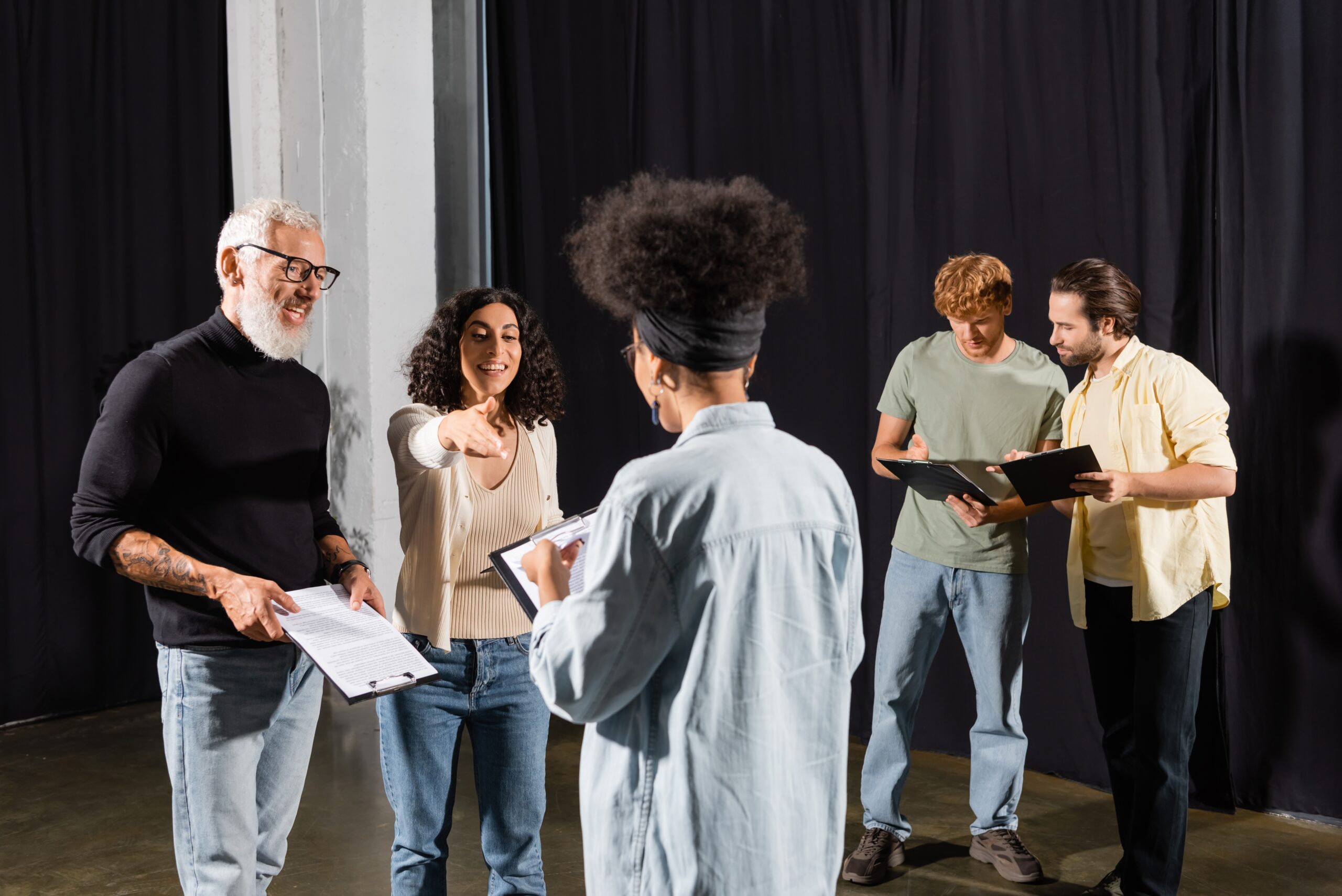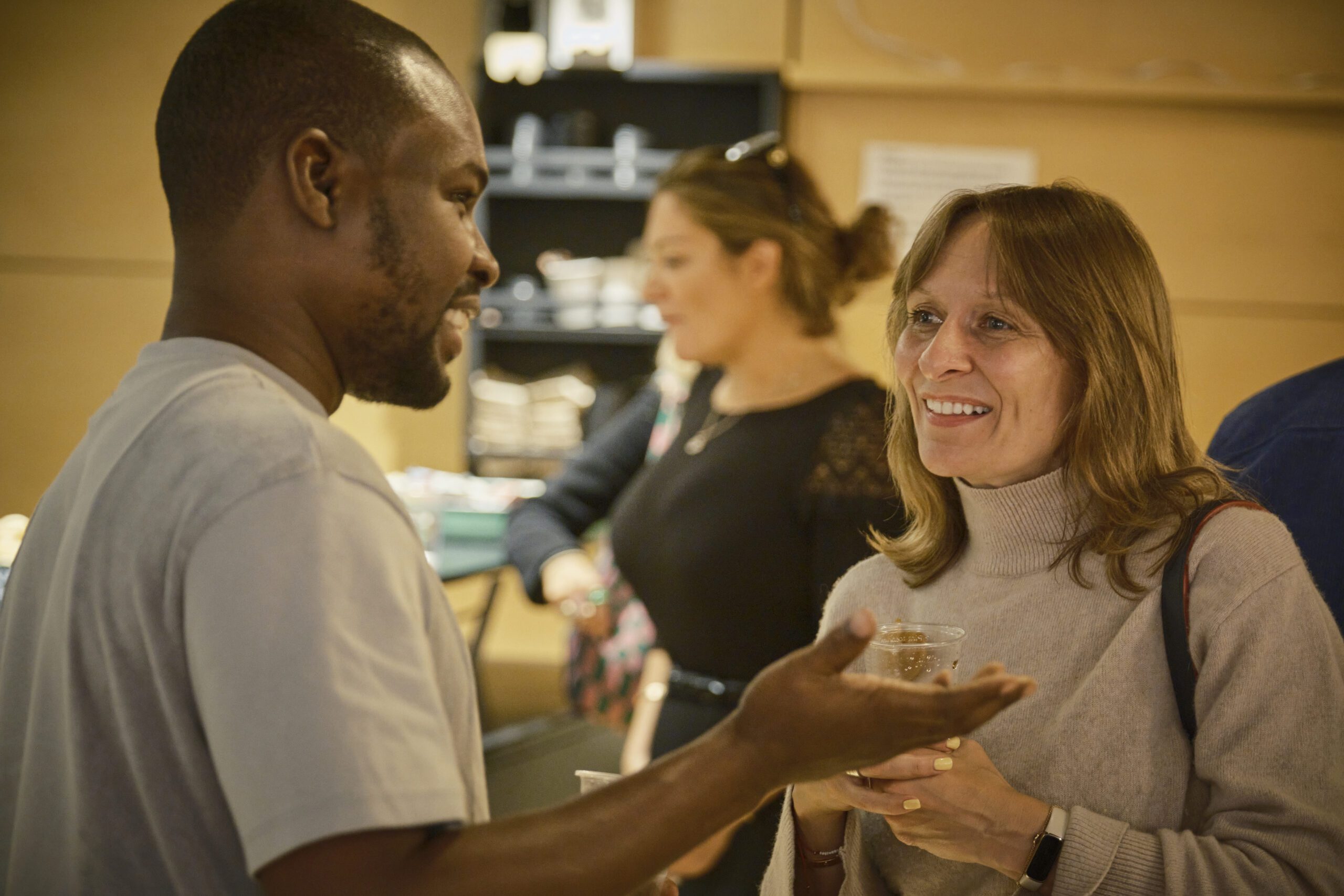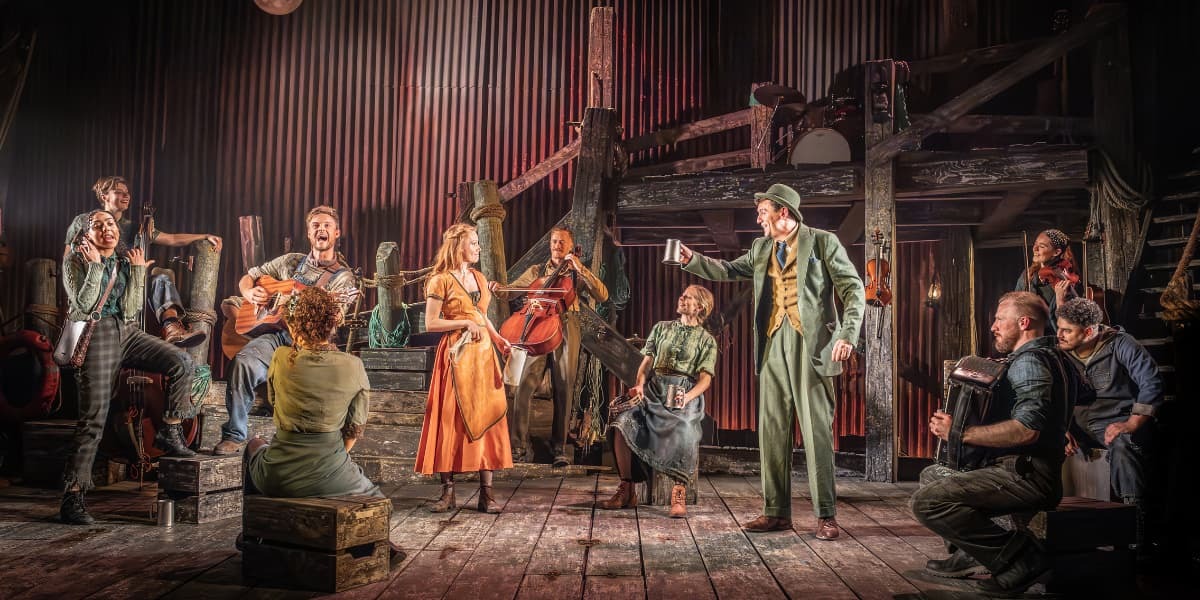Performer Mimi Ndiweni, Agent Gavin Mills and Casting Director Sam Jones talk to Spotlight about how they work together, and their best advice for graduates…
At Spotlight’s recent Open House evening for Graduate members, we discussed the ins and outs of agent, casting director and performer relationships. Casting director Sam Jones, performer and Spotlight Prize winner for 2013, Mimi Ndiweni, and her agent Gavin Mills from Olivia Bell, gathered to answer questions about the industry.
All our panellists have taken different approaches to working in the industry, with Mimi having graduated from Royal Welsh after winning the Spotlight Prize. Gavin said he started out wanting to be a film producer, before working as a runner on Casino Royale. He thought it was a great experience but knew it wasn’t for him, so found agenting a much better fit – a chance to combine his love for the industry with varied, exciting work.
Sam Jones started out at the Royal Shakespeare Company, worked for a time on the agent side, before returning to the RSC in casting. She says the journey into casting “is a sort of apprenticeship really… you need to know a lot about a lot of actors, over time.” Sam says she still goes to the theatre about 3 times a week, and is always watching as much TV and film as possible to get to know who is out there. “You want depth of knowledge, so you’re not always casting an actor in the way they’ve always been cast.”
Post-Graduation Life
Performer Mimi Ndiweni has been out of drama school for about 6 years, and said a lot has changed in this time. When asked about the biggest learning point so far, she said she has learned the importance of balance: “Don’t pressure yourself to carry everything.” It’s important to be able to step back and put auditions into context.
She also pointed out that, “You audition with a lot of the same people. Befriend these people.” Your community beyond drama school is important, and Mimi emphasised how helpful and important a sense of camaraderie will be in getting you through the tough times, the rejection and criticism.
When asked whether there were people she’d still like to work with, Mimi said, “I don’t make those lists for myself,” but Gavin interjected, “I do!” Agents are always thinking about your long-term career trajectory, and bring a lot to the actor’s sense of where and how they will work.
Headshots and Profiles
Our panel had a lot of great insight for graduating performers, including a variety of advice for those looking to make the best first impressions possible: “The headshot is everything,” Sam Jones said. She encouraged actors to really get this right, and consult their agents (if they have one) on which photo is best one to present themselves with.
She also discouraged actors from uploading too many similar photos to their profiles: “The reason for those photos is to show us you can look totally different. If you don’t look totally different, then it’s just narcissistic.”
She noted that other skills can really be worth showcasing, but only if you’ve got something you do exceptionally well. In that case, it’s fine to make a little video of it or include it in a profile/showreel. She also mentioned that driving is a very employable skill, and if you can drive, it’s definitely worth mentioning this.
Finding an Agent
Finding an agent is really about the marriage of personalities; an agent is going to be someone who is very involved in your life and your career, after all! Gavin said of Mimi, “She had an amazing presence on stage.” He saw her performing at Royal Welsh and approached her from there. Nowadays, he says, “I am Mimi’s number one fan.”
Gavin believes all good agents go and watch their performers and get a feel for them before working together, “Some agents just see showreels,” he said, but felt it hugely important to see what your actors can do. He also encouraged Mimi to meet other agents before choosing to work with him. He encouraged other actors looking for representation that they should “get a sense of how people work, how they see your career.”
In terms of what he looks for in people he represents, Gavin said, “Someone who stands out. It’s not just a look – it might be bold decisions that they make.” It can be very varied regarding how many people are signed in a year as well, so this is important to keep in mind. Repeatedly approaching the same agents may not be helpful, however, unless you’re in something new or have something new to show.
Sam also mentioned that, “If you don’t have an agent, it’s not the end of the world.” She encourages actors to be part of a cooperative as an alternative, if they are still looking out for representation from an agent.
Approaching Casting Directors and Agents
Regarding reaching out to industry professionals, Gavin says, “Never call.” Always send an email first. “Only contact [us] if you’re in something,” Sam added. She also said that if you do reach out via email to a casting directing, you should only send your Spotlight link, rather than files with large showreels attached: “Put it on your Spotlight page… It’s a trusted thing.” Sam says this is vastly preferable to sending links to other sites, downloading services, etc.
The Agent-Performer Relationship
“Communication is the most important thing,” Gavin emphasised. This means keeping in touch, even if it is in a small way, to make sure you and your agent know what’s going on and what you’re interested in or available for. “Most clients are on WhatsApp. Sounds ridiculous, but even a small message can make the difference.” Gavin also confirmed that he thinks it’s completely fine to ask your agent about a job that you’re interested in and have heard about, even if they haven’t put you forward. It is a reciprocal relationship in the end, and both parties learn and grow from each other.
Auditioning
Our panellists had a lot of advice for auditions. In terms of expectations from the casting director, Sam says, “I always expect actors to have read the material.” She also said that while you don’t need to drive yourself crazy with research about the people you’re auditioning for, it’s good to know something; “Know that they have a body of work.”
She also emphasised the importance of giving yourself the best chance in the room, which means being prepared: “It is good to be off book if you can so that you can have freedom in the room… [this] frees you up to change or respond [to directions].”
A few things that aren’t often thought about centre around the way you walk into the room, as well. On this, Sam said, “Don’t have great big bags and coats – don’t encumber yourself.” Think about how you’re going to walk into the room, how you’re going to put things down and get ready to perform, as those first few moments are crucial for making a good impression: “Don’t turn your back on the casting directors while you faff about.” Sam adds that you should be thoughtful about how you dress for the part: “If you’re going for a period thing, don’t wear your boob tube,” she says.
Mimi talked about the difference between theatre and film/TV auditions, and whether or not you should come in as your character: “[For theatre auditions] I always walk in as myself.” This isn’t the case with film or tv auditions, she says, where she often comes in in character, or with at least a hint of the character already in the works, limiting any small talk until after the audition is over. Sam agrees, suggesting there’s an element of transformation in theatre, whereas “TV is a bit more literal.”
It is a good idea to take a few notes on your audition after it’s over. “Take notes on who you meet. Actors never remember who we are!” Sam says. But it can be good to make a note of these things, as these are people who you may encounter again, and it can be a good way to ensure you start a courteous relationship with them.
In terms of your performance, Sam said “Give something bold, with flavour to it,” she also acknowledged that, “Being an actor is a ninja mind-trick – when you don’t get the role, it’s nothing to do with you. When you get the role, it’s all about you.”
However, it is important to remember that you can’t predict what it is that you need to do in order to secure a part: “You can’t know what we want and often, we don’t know. It happens in the room.”
Self-taping
“There’s a lot of stuff being cast by self-tape,’ says Sam, making it a really important skill to master. “I’ve cast leading parts [even in] theatre from a self-tape.” Sam’s advice is to, “make yourself into a self-taping club with friends and [shared] equipment. You learn so much.” Doing self-tapes with other actor friends gives you an opportunity to learn from each other and keep the costs down if you do decide to invest in better equipment, though Sam reiterated this may not be necessary, as long as you achieve a fairly professional result on a phone. Spotlight has a whole podcast on how to self tape on your phone for more information on how you can achieve this!
Gavin also reiterated the importance of a good self-tape as sometimes these can be used to put a person forward in place of a showreel. “Sometimes that can be enough as well,” he says. He agreed with Sam, “Do it with another actor” and finally, “Make sure you know how to send things across.” You don’t want to be caught out, unable to send your self-tape in when it counts! You can see a whole host more advice about this in our self-taping video, as well as our very detailed video about how to make your own showreel.
Understanding the Industry
Understanding the industry is important for anyone hoping to work in it, and this requires actors to be very active and put themselves out there. Including offering their time to local theatres, and getting involved with other professionals. “Be curious. Go and see things, read scripts. Be plugged into the business,” Sam says.
In terms of understanding how casting directors and agents work, Sam says that “[Casting directors] are often attached to projects before a director in film and TV. In theatre, it’s a director who asks for you.” Projects vary, and Sam often works closely with producers, often before directors. Gavin said understanding who often works with who is key to his work as an agent, and allows him to keep an eye on what dots usually need to connect for projects to go ahead. This helps him figure out a good fit for his clients. There’s a lot of interplay between agents and casting directors in general, too. “Everyday we talk to agents,” Sam says. “We nurture those relationships.”
Advice for When You Don’t Get the Job
An inevitable part of acting as a career is that there will be times when you aren’t getting work, or when you come close but don’t get the part. Mimi says, “I would get so close to [getting] things, and take it super personally…” It is hard to deal with, but in her time out from drama school she has come to learn an important lesson: “It finally clicked within me that it’s not personal.” Mimi says that shift in attitude was a big step in finding more joy in her work, as well as the realisation that: “There’s nobody in this industry who wants you to fail.” Mimi recommends Siberian Lights and the Mono Box if you’re between jobs and looking for workshops or other opportunities to keep honing your craft.
The industry is a tough place, and Sam also talked about the importance of thinking about what you will do outside of acting. “Have some paid work. Find some flexible things that can earn you money. Because not being totally skint will help in an audition.” Feeling like you desperately need a part won’t help you succeed in auditions, and can come across in unexpected ways. So giving yourself the space to be able to enjoy the process of auditioning will help. It isn’t easy to navigate, of course, but Sam encourages you to “Try and get financial advice. Talk to other actors about how they do that.”
And finally…
Ultimately, Sam said: “All we want to know is, ‘What are you like? Can you act?’” So be sure to put your best foot forward, and keep it as straightforward and clear as possible. Get your best material together in a showreel, have some good quality headshots taken, and think carefully about what kind of work you’d like to do. We’ve got a whole host of other great information about starting out in the industry, and the essentials you need to know.
Got any other questions for us? Ask us by emailing questions@spotlight.com!



















